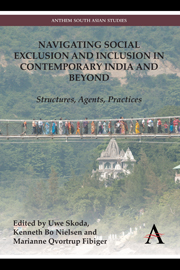 Navigating Social Exclusion and Inclusion in Contemporary India and Beyond
Navigating Social Exclusion and Inclusion in Contemporary India and Beyond Book contents
- Frontmatter
- Contents
- Acknowledgements
- List of Contributors
- 1 Introduction: Navigating Exclusion, Engineering Inclusion
- Part I Spaces and Values
- 2 Cosmopolitanism or Iatrogenesis? Reflections on Religious Plurality, Censorship and Disciplinary Orientations
- 3 Dependent Husbands: Reflections on Marginal Masculinities
- 4 Exclusion and Inclusion: Navigation Strategies among Hindus in the Diaspora – A Case Study from Denmark
- Part II Communities and Politics
- Part III Resources and Development
3 - Dependent Husbands: Reflections on Marginal Masculinities
from Part I - Spaces and Values
Published online by Cambridge University Press: 05 September 2013
- Frontmatter
- Contents
- Acknowledgements
- List of Contributors
- 1 Introduction: Navigating Exclusion, Engineering Inclusion
- Part I Spaces and Values
- 2 Cosmopolitanism or Iatrogenesis? Reflections on Religious Plurality, Censorship and Disciplinary Orientations
- 3 Dependent Husbands: Reflections on Marginal Masculinities
- 4 Exclusion and Inclusion: Navigation Strategies among Hindus in the Diaspora – A Case Study from Denmark
- Part II Communities and Politics
- Part III Resources and Development
Summary
Across a transcultural spectrum of representations, the figure of the househusband is lampooned as a virtual standup comic act with brooms and aprons – stage props of domesticity – signaling a surrender of masculinity. Humourists have had a field day with blokus domesticus (McMahon 1998), nowhere more explicit than cartoon strips and ribald humour. Burlesque images on the Internet cast the house-proud househusband smiling at a food processor or in a state of ecstasy over a shining floor. In one of the cartoons, the caricature is completed by the counter image of the wife/feminine partner reading a financial newspaper, waiting topless for her househusband to iron her business shirt. The sexual imagery heightens the loss – indeed the docile sacrifice – of masculinity and the transference of power to the feminine ‘alter’ ego. The semiotics of househusband cartoons naturalises negative relations between the doing of domestic work and the slaughter of a male self. So persuasive is this image that it has become the privileged representation in a global discourse of degraded masculinities (Krimmer 2000; Wentworth and Chell 2005). The representation has acquired the nomadic ability to occupy spaces in cultural territories where it does not belong, so that right across the world, the term ‘househusband’ immediately connotes a marginal man and a socially disqualified masculinity.
- Type
- Chapter
- Information
- Navigating Social Exclusion and Inclusion in Contemporary India and BeyondStructures, Agents, Practices, pp. 41 - 54Publisher: Anthem PressPrint publication year: 2013


